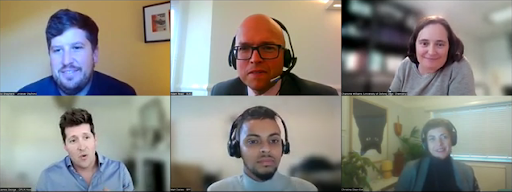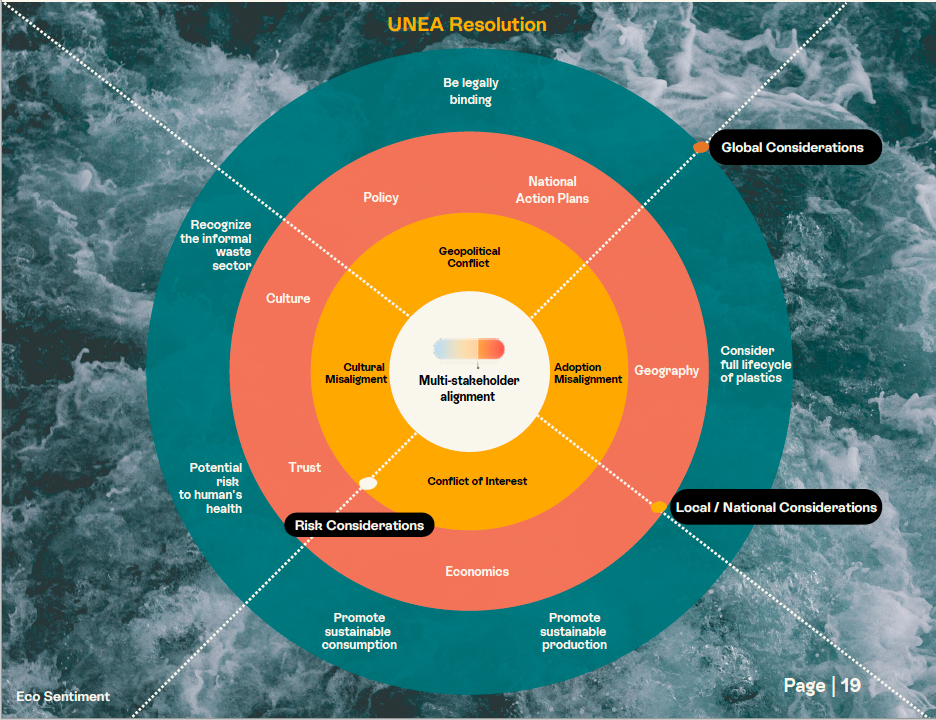OPLN Convenes UK Treaty Dialogues Session ahead of INC-1, UN Treaty for Plastic Pollution
November 1, the Ocean Plastics Leadership Network (OPLN) and the UK government convened the UK Plastics Treaty Dialogues—an inclusive activist-to-industry multi stakeholder program to address the plastics pollution crisis—in preparation for the UK’s involvement in negotiating a global plastic pollution treaty at the upcoming First Intergovernmental Negotiating Committee (INC-1).

The dialogues were catalyzed by OPLN Steward and UK Lead Sian Sutherland and supported by OPLN members and supporting partners The Coca-Cola Company, Nestlé, and Unilever. The UK Dialogues brought together voices and perspectives from 45 impact organizations central to the plastics crisis, including sector stakeholders from:
- Research and academia
- NGO
- Break Free From Plastic Members
- Waste management
- Recyclers
- Small local businesses
- Consumer goods
- Retail
- Fashion
- Food Service
- Petrochemicals
- Manufacturers and producers
- County Council
The UK government—a co-sponsor to the UNEA-5 resolution initiating negotiations for a global plastic pollution treaty, as well as a member of the High Ambition Coalition to End Plastic Pollution—is committed to ending the plastics crisis by 2040.
“Plastic pollution has a direct and deadly effect on our wildlife, polluting our ocean and damaging our planet,” said Thérèse Coffey, Secretary of State for the UK Department of Environment, Food and Rural Affairs (Defra). “Our laws are already helping to cut waste domestically, and international action is needed to end plastic pollution by 2040. The first of the UK dialogues was important in bringing together government, business and environmental organisations on this issue – it’s vital for us all to work together if we are to make progress in tackling plastic pollution globally.”
Together with Greenpeace and the World Wildlife Fund (WWF), OPLN launched the Global Treaty Dialogues (GTD) in March 2021 as a neutral convening program bringing disparate multi-stakeholder voices together to promote engagement toward a UN treaty on plastics pollution. Since then, OPLN has facilitated 18 dialogue sessions in six countries over the past two years, with the UK as the seventh national dialogue.
At the Fifth UN Environment Assembly on March 2, 2022, member states agreed to negotiate a global plastics treaty that:
- Is legally binding
- Considers the full lifecycle of plastics “from source to sea”
- Promotes sustainable plastics production
- Recognizes plastics’ potential risk to human health
- Recognizes the role of waste pickers and informal workers in solving the global plastics crisis
Beginning November 28, the global community gathers in Uruguay at the INC-1 to initiate negotiations for a binding global plastics treaty, the beginning of a two-and-a-half year negotiating process with a global plastics treaty at the finish line. Ahead of each Intergovernmental Negotiating Committee, OPLN will convene global dialogues in key member states, each session becoming more and more prescriptive as treaty specifics are hashed out on the world stage.

Panel discussion: Cross-Sector Considerations
At the UK Dialogues, a panel of experts set the context across industries and organizations at the center of treaty negotiations. During a panel discussion led by OPLN Network Ambassador James George, representatives from Unilever, University of Oxford, Suez, and the British Plastics Federation explored opportunities and challenges associated with building a robust plastic pollution treaty position in the UK, as well as the unprecedented opportunity the Negotiations provide in harmonizing approaches that governments and sectors can take in ratifying a Treaty.
Panelists represented disparate views across the plastics value chain, but all agreed that plastics musts be made more recyclable, plastics design and infrastructure for collection and processing must be improved, uniform definitions and consumer messaging need to be deployed, and a holistic view of the entire global trade in plastics must be central to all Treaty considerations.
Panelists from all industries and sectors were eager to gain cross-sector perspectives for effectively eliminating plastic pollution and waste.

UNEP Definitions
Christina Dixon of the Environmental Investigation Agency led a capacity-building breakout session focused on the full lifecycle of plastics, including key definitions and guidelines provided by the United Nations Environment Programme (UNEP).
The plastics life cycle lacks common language and understanding across sectors. And yet the plastics ecosystem is a globalized, interconnected phenomena. Without consideration of the whole, the individual will fall. The Global Plastics Treaty offers a once-in-a lifetime opportunity to clarify and standardize definitions and metrics for catalyzing action at-pace and at-scale needed to address the global plastics crisis. UNEP provides concrete, science-based definitions of upstream, midstream, and downstream, providing guidance for connected interventions and holistic life cycle approaches throughout the plastics value chain, not just regional or national considerations.
At a bare minimum, the Treaty will cover polymerization (when raw material becomes plastics) and onwards, but negotiators will also be tasked to look further upstream into petrochemical feedstocks. UNEP definitions are pivotal in building common language and understanding in the ensuing Negotiating process.
According to Oxford University, a growing share of plastic feedstocks will be derived from non-fossil sources, including recycled material, bio-based, and CO2 derived polymers. Mitigating ecosystem and atmospheric pollution associated with virgin fossil plastics requires a redesign of plastics from the molecular to the systems levels, creating a new plastic ecosystem fit for purpose and fit for end-of-life, with zero carbon and pollution impacts.
Breakout groups
The UK Dialogues breakout groups focused on the following:
- Upstream focused on the role that fossil fuel feedstocks, the use of alternative feedstocks such as recycled content and bio-based polymers, and the production processes of the petrochemical industry can play in a circular plastics economy.
- Midstream considered how the design and manufacturing of plastic and plastic-containing products and their progress from cradle-to-grave can be engaged in a plastics Treaty.
- Downstream explored how refurbishing and recycling, the trade of plastic waste, and disposal of residual waste can be thoughtfully designed to eliminate plastic pollution and waste.
Each breakout group explored respective interventions capable of reducing and/or eliminating the potential environmental and social harm associated with each step of the plastics life cycle, and presented outcomes to representatives of the UK government and general audience during the UK Dialogues.
OPLN also deployed a sentiment survey to capture further insights from stakeholders across upstream, midstream, and downstream.

This UK Treaty Dialogue is a two year program in partnership with the UK Government in conjunction with each International Negotiating Committee. OPLN continues to expand its reach of stakeholders in anticipation of future dialogues convening. If you’re interested in learning more, contact Marta Lopata at marta@eqonetworks.com.